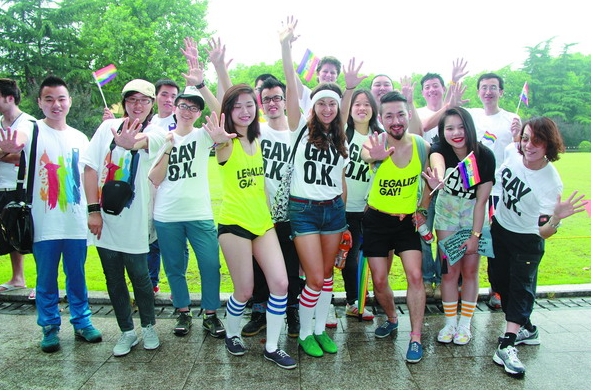Rainbow flag flies high in Shanghai
China Daily, May 7, 2014 Adjust font size:
|
|
| Gay social groups attend gatherings in Shanghai, which has witnessed an increasingly open gay subculture. [photo / China Daily] |
But whether they live between panda sanctuaries and streets laced with spicy hotpot restaurants, or party from the French Concession to the Bund, life is not all peaches and cream for those whose sexual desires fall outside the mainstream.
Sometimes the long march toward broader cultural acceptance may feel like a drawnout guerrilla war conducted at night. The recent opening of Icon in Shanghai was heralded as a milestone event, betokening an important step forward.
But the club proved surprisingly discreet, almost buried in the underbelly of Shanghai Stadium. There was no advertising at the closest subway station or on nearby streets. Even from 25 meters away, it was wellcamouflaged.
As the clock ran down to midnight one Friday in early February during the two-story venue's soft opening, the majority of young men stood around awkwardly, their wardrobe hinting at long journeys from farflung rural areas.
Displays of public affection were rare, at least at such an early hour. One heavyset man was dressed flamboyantly in a black dress with an Elvis coiffure. A suited couple gyrated onstage as neon mosaics of subway maps flashed across their faces.
"Gay people in China are very shy. I hate it," says Shane. "I respect Westerners because they're much more confident about their identity."
When the owners of Icon tried to open another gay venue, Angel, in the downtown area in 2011 it was shuttered within a month. After this they apparently bounced like a carnival road show among temporary hosts-Dubai, Obama-before settling down.
"As they don't advertize, you have to be pretty plugged in to find these places sometimes," says Shainker, affronted by the lack of material available online.
When asked how long he thought it would take for Chinese society to accept the gay community, even in people's own homes, Dwayne says "50 to 100 years".
Shale disagrees. "I think within one generation the mindset will change-about a lot of things," says the Australian, who battled similar discrimination decades ago in his home country.
"I'm not as pessimistic as Dwayne."



